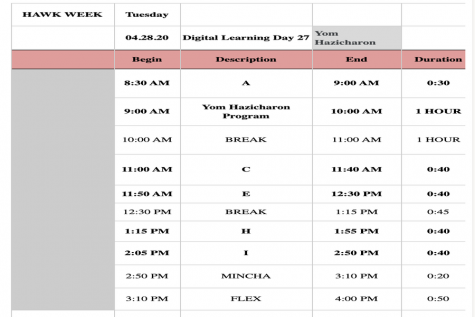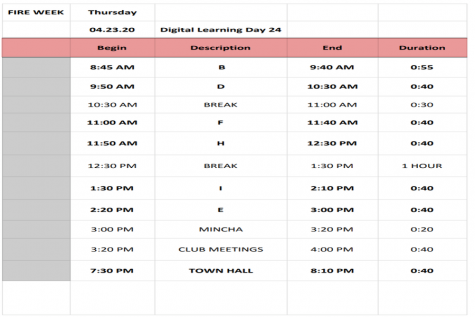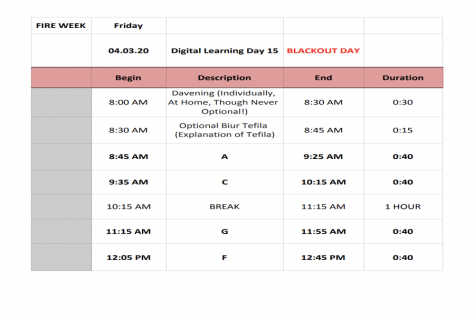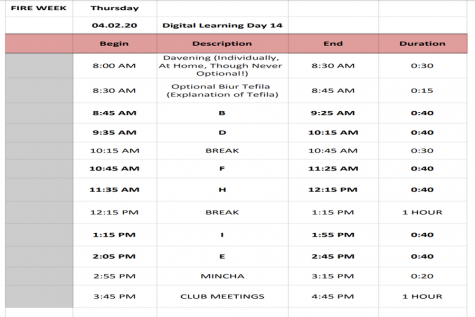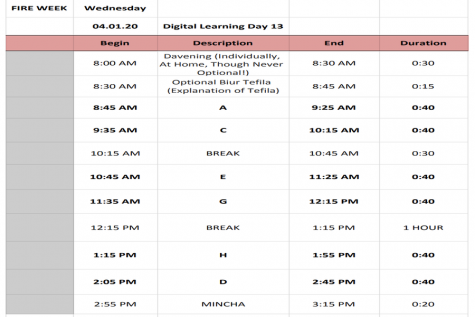New schedule for next year to include “flex” period and schoolwide lunch
Dismissal time will stay the same, class time and Town Hall are reduced, MAP and SWAP are gone
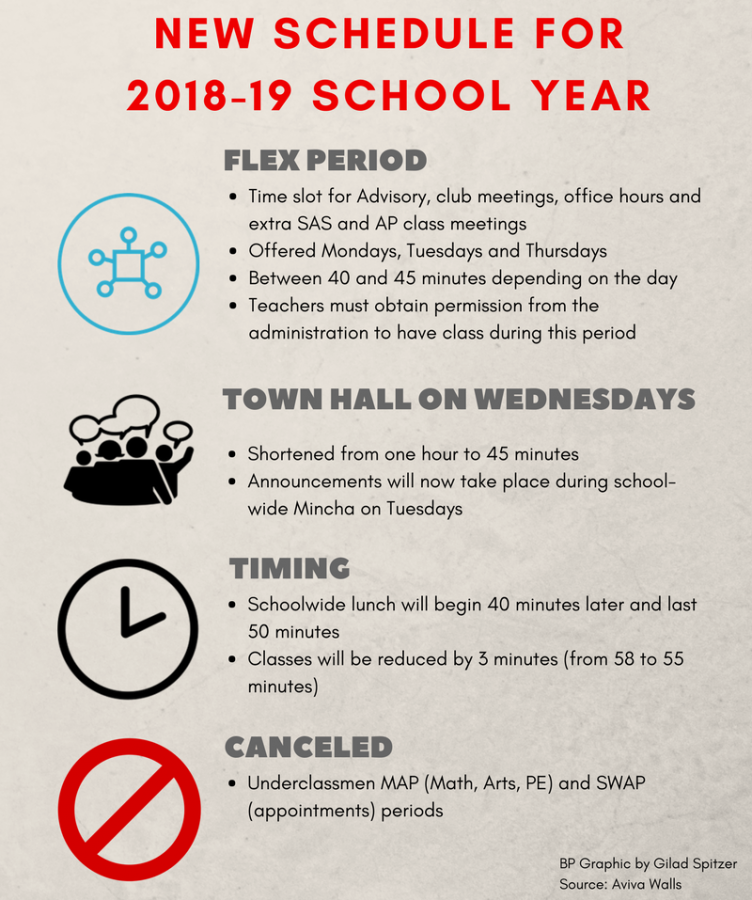 A completely new schedule is coming next year, with a three-times-a-week “flexible” time slot to be used for Advisory, club meetings, office hours and extra SAS and AP class meetings, school officials confirmed yesterday.
A completely new schedule is coming next year, with a three-times-a-week “flexible” time slot to be used for Advisory, club meetings, office hours and extra SAS and AP class meetings, school officials confirmed yesterday.
The new schedule was created by Dean of Academic Affairs Aviva Walls and Director of Curriculum and Instruction Dr. William Walton. It was shown to members of the Agenda Committee and some other students before Passover break, and Ms. Walls shared it with the Boiling Point late this afternoon.
Not all details of the schedule are yet final, Ms. Walls said, but in its current working version, the new “flex period” would be offered Mondays, Tuesdays and Thursdays and be 40 to 45 minutes long, depending on the day.
Town Hall would use the flex period on Wednesday, and school ends too early on Fridays to have room for it.
Class periods in the plan are 55 minutes instead of the current 58 minutes long, and Town Hall would be shortened by 15 minutes, to 45 minutes instead of an hour. Dismissal times are not changed.
General Studies Principal Mr. Daniel Weslow said the idea was to give students more free time.
“We have highly motivated and amazing students who often find themselves burning it on both ends with respect to school work, co-curriculars and community environments,” Mr. Weslow said in an interview.
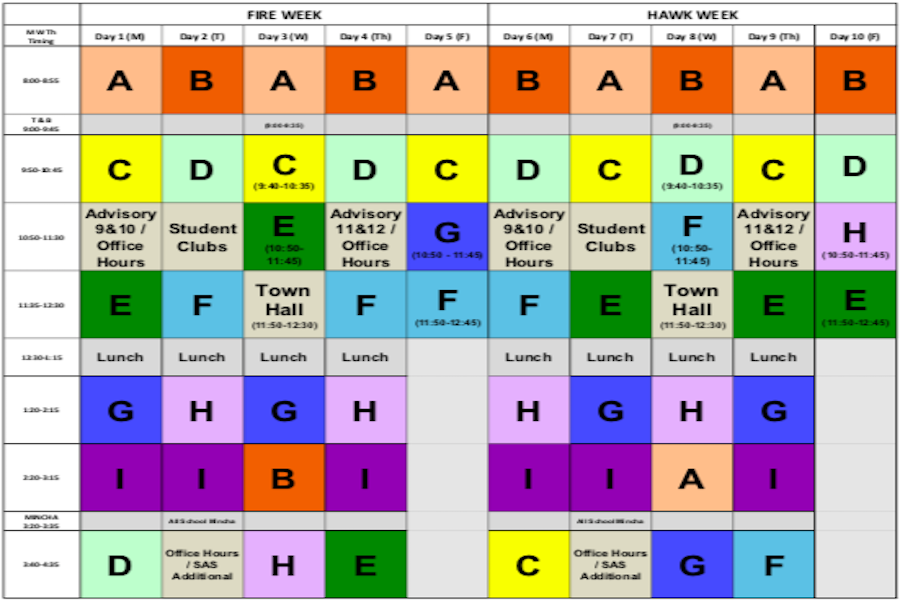
However, the flex period will also be available to honors or advanced classes whose teachers can convince administrators they need it. Lunch classes are a long-standing tradition at Shalhevet, with some students missing lunch several times a week and having no time to meet with teachers or take makeup exams.
Since the flex period is an attempt to fix that problem, Dr. Walton said academic use of Flex period would be limited and based on a teacher’s previously demonstrated need for it — and scheduled by the school. He also said a teacher who wants to use a Flex period would have to ask the administration, which would determine when and how often the extra class can meet.
“The [new flex] period is supposed to be flexible and designed to be used in the best way possible,” Dr. Walton said.
The plan announced today also eliminates the two-year-old MAP and SWAP periods for ninth- and 10th-graders. MAP is an interchangeable midday time slot for Math, Arts and PE, while SWAP was originally school-wide appointment period, though this year only for ninth- and 10th-graders.
In the new plan, all grades are on the same schedule, with the same lunch periods as well.
Lunch would start 40 minutes later than it is now and last 50 minutes, according to Dr. Walton. That would mean that there are usually three classes plus Flex in the morning and just three classes in the afternoon.
Agenda Vice Chair Talia Gill said she was “a little apprehensive” about Town Hall moving to Wednesdays.
“It gives us one less day to plan Town Hall,” said Talia, “because we rarely end up planning a week before, because of prior commitments.”
She said announcements would be made at a new Tuesday schoolwide Mincha instead of taking time from Town Hall, to compensate for the shorter meeting
Even though details still need to be sorted out, a version of this schedule will go into effect next year, officials said.
Mr. Weslow said one impetus was the complicated lunch schedule caused by MAP, which made it hard for clubs to meet. But minor adjustments this year proved insufficient.
“We started with conversations with the Ed Lead Team and then moved to a faculty meeting and a faculty survey,” he said.
Ms. Walls and Dr. Walton then reviewed the data and then “met with elected Just Community officials to get more feedback.”
The new schedule, he said, is “something that we feel can meet the needs of our growing school programs and provide more opportunities for students to connect with teachers and each other in a formal and informal capacity,
“So this provides the opportunity to have a flex period,” said Mr. Weslow, “to have a common lunch, and we went through a thoughtful process where we went through multiple stakeholders and finalized with enough time to look at course offerings for next year and to reduce conflicts.”
It was too soon to say how students and teachers — especially math teachers, who were fond of the extra class meetings they had in the MAP period — would react. But Talia made a prediction.
“It will be weird at first, just like the MAP schedule was weird at first,” she said. “It might get initial dislike because it’s different, but I’m confident it will be beneficial in the long run.”

Clara Sandler was co-editor-in-chief during the 2018-19 school year and then studied at the Midreshet Lindenbaum seminary in Jerusalem. She is now a junior at the University of Chicago.






